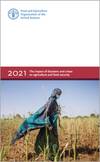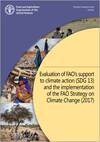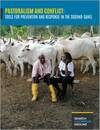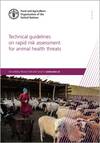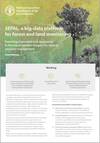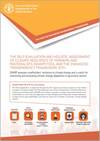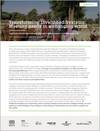This policy brief is intended to inform decision-makers of nine transformational actions to sustain dryland production systems under the impact of climate change. It highlights the relevance of the local context for interventions and the importance of traditional and tested adaptive agrosilvopastoral strategies for building resilience. In addition, it emphasizes the potential for scaling up and using complementary technologies over wider areas. In particular, the roles of both women and men should not be neglected in terms of maintaining, creating and restoring dryland sustainable landscapes.
Year of publication: 2021Organization: Organisation des Nations Unies pour l'alimentation et l'agriculture (FAO)
Topic: Sécurité alimentaire, Résilience
Language: English
Type of document: Politiques et législation
Geographical coverage: Global
On top of a decade of exacerbated disaster loss, exceptional global heat, retreating ice and rising sea levels, humanity and our food security face a range of new and unprecedented hazards, such as megafires, extreme weather events, desert locust swarms of magnitudes previously unseen, and the COVID-19 pandemic. Agriculture underpins the livelihoods of over 2.5 billion people – most of them in low-income developing countries – and remains a key driver of development. At no other point in history has agriculture been faced with such an array of familiar and unfamiliar risks, interacting in a hyperconnected world and a precipitously changing landscape. And agriculture continues to absorb a disproportionate share of the damage and loss wrought by disasters. Their growing frequency and intensity, along with the systemic nature of risk, are upending people’s lives, devastating livelihoods, and jeopardizing our entire food system. This report makes a powerful case for investing in resilience and disaster risk reduction – especially data gathering and analysis for evidence informed action – to ensure agriculture’s crucial role in achieving the future we want.
Year of publication: 2021Organization: Organisation des Nations Unies pour l'alimentation et l'agriculture (FAO)
Topic: Sécurité alimentaire, Résilience
Language: English
Type of document: Technique
Geographical coverage: Global
This evaluation assesses the extent to which FAO adopted an effective, coherent and transformative approach to its work on climate action from 2015 to 2020, by contributing to the achievement of SDG 13 targets and the Paris Agreement. The methodology included portfolio analysis, quantitative content analysis of over 500 documents, participatory stakeholder workshops, desk reviews, interviews with 488 stakeholders, analysis of key FAO products, 3 global surveys, and 13 country case studies.
Year of publication: 2021Organization: Organisation des Nations Unies pour l'alimentation et l'agriculture (FAO)
Topic: Changement climatique
Language: English
Type of document: Technique
Geographical coverage: Global
The purpose of this Toolkit is to provide funding agencies, diplomatic staff, and aid practitioners with strategic guidance on how to design interventions to prevent or resolve conflict associated with cross-border pastoralism. Drawing on a wealth of research and programmatic experience across the Sudano-Sahel, from Mali to Sudan. It is structured into eight sections, including an introduction and seven Modules. Each Module is tailored to a different sector and presents 3-5 tools and strategies that can be used to address one slice of pastoralism-related conflict. These tools and strategies are based on a review of past programs and include guidance on what makes these interventions succeed or fail. Each Module also contains a brief list of questions to guide context analysis and planning, and links to external resources.
Year of publication: 2021Organization: Auteurs individuels
Topic: Conflit, Services environnementaux, Sécurité alimentaire, Jeunesse et égalité des sexes, Régime foncier, Résilience
Language: English
Type of document: Technique
Geographical coverage: Afrique occidentale, Afrique centrale
The occurrence and spread of an animal health threat can be prevented when a timely assessment of the risk is carried out to inform prevention, response and control measures. These technical guidelines on rapid risk assessment (RRA) are designed as a simple and practical tool to be used by veterinary services to build risk assessment capacities and assist decision-makers in conducting qualitative RRA on the emergence, occurrence and/or spread of animal health threats. Using available evidence, data and information, a multidisciplinary team can conduct an RRA in a short time (within two weeks).
Year of publication: 2021Organization: Organisation des Nations Unies pour l'alimentation et l'agriculture (FAO), Auteurs individuels
Topic: Services de santé, Résilience, Services sociaux
Language: English
Type of document: Technique
Geographical coverage: Global
Accurate information is critical for natural resources to be managed sustainably. Developed by the Food and Agriculture Organization of the United Nations (FAO), the System for Earth Observation Data Access, Processing, and Analysis for Land Monitoring (SEPAL) helps countries monitor and report on forests and land use. SEPAL offers users unparalleled access to satellite data, an easy-to-use interface, and powered by cloud-based supercomputers, paving the way for improved climate change mitigation plans and data-driven land-use policies.
Year of publication: 2021Organization: Organisation des Nations Unies pour l'alimentation et l'agriculture (FAO), Auteurs individuels
Topic: Régime foncier
Language: English
Type of document: Politiques et législation
Geographical coverage: Global
This leaflet provides an overview of the Self-evaluation and holistic assessment of climate resilience of farmers and pastoralists (SHARP) tool and how it might be used to help countries fulfill their reporting requirements related to the Paris Agreement's Enhanced Transparency Framework. SHARP assesses smallholders' resilience to climate change and is also useful for monitoring and evaluating climate change adaptation in various agriculture sectors. It contributes to SDG 13: "Take urgent action to combat climate change and its impacts".
Year of publication: 2021Organization: Organisation des Nations Unies pour l'alimentation et l'agriculture (FAO)
Topic: Changement climatique, Résilience
Language: English
Type of document: Politiques et législation
Geographical coverage: Global
This brief reviews how farming, agro-pastoralist, and pastoralist livelihood systems in Darfur are permanently changing in response to these major changes and in the face of ever-increasing pressure on natural resources. We examine these changes by livelihood specialization, describe the different roles men and women play in these changes, and highlight how the changes impact them differently. We also examine how changes in strategies affect the resilience of those strategies and how past strategies have become less effective, driven in part by pressure on natural resources. At the same time, we show how innovations are providing new opportunities to increase production and revenues while sustainably managing natural resources.
Year of publication: 2021Organization: , Auteurs individuels,
Topic: Participation
Language: English
Type of document: Technique
Geographical coverage: Afrique orientale



